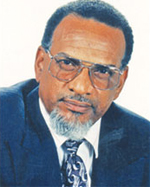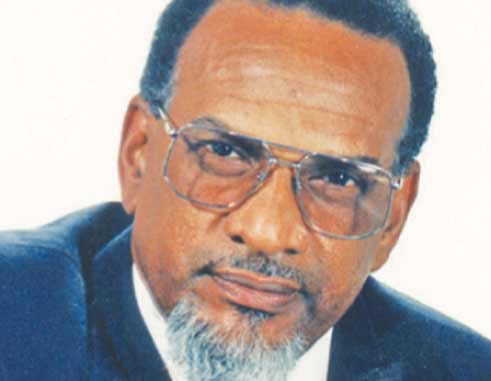
EVERY year at this time as the island marks ‘Nobel Laureate Week’ my mind turns searchingly for signs that the people have embarked on the road to transforming themselves in a way that deserves of their two Nobel Laureates. I have tried very hard particularly in the last ten years to search for a glimpse (a slight inference if you prefer), that a transformative journey has been embarked upon by the rank and file. Alas, there are still too few markers to distinguish it from the Caribbean herd.
The creation of new nomenclature for the former Ministry of Social Affairs styling it as Ministry of Social Transformation was at first interpreted as a hopeful signal. But after careful observation it became clear that the new style was not underpinned by new policy directions to purposely use the new nomenclature as a new foundation upon which the work and life of the island’s Nobel Laureates would be used to transform the people and country from darkness to light.
It also appears that there may have been a meeting of minds, so to speak, of Caribbean Governments (Caricom Heads perhaps?), wherein it was agreed to introduce the word transformation, into the lexicon of government services perchance to indicate that there was something to be transformed. Implicit in the idea of transformation is that something needs to be changed from one state to another – leaving an unsatisfactory past behind it. Such migration implies moving to a better, superior, and more modern progressive situation – and citizenry.
Notwithstanding the above observations the question regarding the transformation of the internationally accepted works (and scholarship), of the island’s Nobel Laureates and their relevance to national development solicits a question or two. Who amongst her sons and daughters is prepared to undertake the long and arduous task of applying the economic thesis of Sir Arthur Lewis to the island’s long term development? When will a resolute leader with the vision, tenacity and selflessness, of one such as the former leader of Singapore Lee Kwan Yew, arise to chart a new and transformed way for Saint Lucia and Caribbean? For how long will the region be stuck in a colonial and slavish mind-set, and who will help it leap frog into the twenty-first century?
When will the life of the poet laureate (forget his deep and incisive spiritual writings for the time being), be made required reading in the island’s schools? Who is left to tell the story of these two great sons of Saint Lucia to the youth of the Caribbean? Who will instruct the people that only the love and dedication of their struggling parents (and the power of the Holy Spirit?); distinguish these two men – the Nobel Laureates – from many youngsters in towns and villages in the Caribbean?
These two great sons never set out to change the world or to transform their homeland. In the colonial era wherein they were born and raised, the dream of international fame was remote and unimaginable. Arthur Lewis was denied entry into University to study Engineering, his first love. Derek Walcott was frustrated out of the University College of the West Indies and ended up in England. In a way, today’s youth enjoy an advantage the Laureates never had. There are more opportunities and more assistance to achieve greatness in a wider field of disciplines, including sports. Parental love and guidance, discipline and determination are necessary ingredients to emulate Lewis and Walcott.
The opportunity to throw up a leader who can and will lead the charge to transform Saint Lucia into the New Jerusalem deserving to be called the birthplace of Nobel Laureates remains a challenge. But it is doable. We need to think positive thoughts and to keep hope alive. The fact that some better minds have failed in the work of transforming society should not deter those who work with faith in their hearts from trying, even in the midst of pervasive fear, ignorance and self doubt.
These and other thoughts come to mind whenever I hear someone say Saint Lucia has the most Nobel Laureates per capita. What does that mean? I would wager that when one takes a realistic look at the physical state of the island, that is, the sight and smell of its towns and villages, including its capital and seat of government, there is little to recommend it as deserving of the birth place of its Nobel Laureates.
Still, there is hope. Today, Saint Lucians travel more and are therefore able to compare their island to others in terms of cleanliness, loose animals and vagrants on the streets, green open spaces and such like. Those who remember what Castries was like in the sixties and before will know of what I speak. Truth is the island has retained its raw natural beauty, and its people are still largely friendly. However, wherever one turns today one sees and smells the decay and sees the abuse particularly in and around Castries.
In addition, a new generation seems bent on inventing a new language which imports a smattering of bastardized Kwéyól, a little broken English, and spoken with a Jamaican-patois twang – a mix seemingly designed to anger their laureates and perhaps as a mark of protest, separation and apartness – this, at a time when the world is leaning towards excellence in every field of endeavour.
Such developments appear to leave the voice of the poet laureate and that of the master economist crying in a wilderness. The new junk language reminds one of a line by another great Caribbean poet: ‘Our colour beats a restless drum but only the bitter come.’ As if to add insult to injury, the junk gains credibility from the Ministry of Education, (not the Ministry of Transformation), to teach Kweyol as an alternative to English.
However one chooses to look at it, Nobel Laureate week forces us to question the efforts, aimed at transforming the island for better. Policies need execution and supervision. These in turn need constant monitoring at all levels so that such a thing as happened at the official opening of “Wallcott House” instead of ‘Walcott House’ never repeats itself. This sad example confirms that we are a society in need of transformation from top to bottom.














/
Such Hypocrisy Black Pete Josie ! Your and your Roman Catholic Member of The British Empire, lol. Empty talk to further confuse the masses with these shameful instructions to worship the Caucasian as God, in your Back pocket. Who do you think you are fooling ? The negro who calls himself Uncle TOM TOM ? Just take a look at your so-called change:
https://www.facebook.com/317019411788935/videos/589067564584117/
/
/
Negroes have called me racist for speaking truthfully about the evil of the Caucasian Christian and the evil of White supremacy especially in the European Religions. Now the Black Christians are beginning to reject this White God Satanic Doctrine, but even the U.N. is now owning up to this problem of White Supremacy. Black Pete Josie, when will you and your stripper boyfriend admit the truth and stop worshiping this naked Caucasian as your God ?
Associated Press |
U.N. panel suggests slavery reparations in U.S.
WASHINGTON — The United States should consider reparations to African-American descendants of slavery, establish a national human rights commission and publicly acknowledge that the trans-Atlantic slave trade was a crime against humanity, a United Nations working group said Friday.
The U.N. Working Group of Experts on People of African Descent released its preliminary recommendations after more than a week of meetings with Black Americans and others from across the country, including Baltimore, Chicago, New York, Washington, D.C., and Jackson, Miss.
After finishing their fact-finding mission, the working group was “extremely concerned about the human rights situation of African-Americans,” chair Mireille Fanon Mendes-France of France said in the report. “The colonial history, the legacy of enslavement, racial subordination and segregation, racial terrorism and racial inequality in the U.S. remains a serious challenge as there has been no real commitment to reparations and to truth and reconciliation for people of African descent.”
For example, Mendes-France compared the recent deaths of unarmed Black men such as Michael Brown and Eric Garner at the hands of police to the lynchings of Black men in the South from the post-Civil War days through the Civil Rights era. Those deaths, and others, have inspired protests around the country under the Black Lives Matter moniker.
“Contemporary police killings and the trauma it creates are reminiscent of the racial terror lynchings in the past,” she told reporters. “Impunity for state violence has resulted in the current human rights crisis and must be addressed as a matter of urgency.”
Some of the working group’s members, none of whom are from the United States, said they were shocked by some of the things they found and were told.
For example, “it’s very easy in the United States for African-Americans to be imprisoned, and that was very concerning,” said Sabelo Gumedze of South Africa.
Federal officials report that 37 percent of the state and federal prison populations were Black males in 2014. The working group suggests the U.S. implement several reforms, including reducing the use of mandatory minimum laws, ending racial profiling, ending excessive bail and banning solitary confinement.
“What stands out for me is the lack of acknowledgement of the slave trade,” said Ricardo A. Sunga III, who lives in the Philippines.
The working group suggests monuments, markers and memorials be erected in the United States to facilitate dialogue, and “past injustices and crimes against African-Americans need to be addressed with reparatory justice,”
The group will suggest several U.S. changes to improve human rights for African-Americans, which also include establishing a national human rights commission, ratifying international human rights treaties, asking Congress to study slavery and its aftereffects and considering reparations. — (AP)
The Working Group of Experts on People of African Descent was established in 2002 by the then-Commission on Human Rights, following the World Conference against Racism in 2001.
It also visited the United States in 2010, where its final report found similar problems, including blacks facing disproportionately high unemployment, lower income levels, less access to education, “problematic access to quality health-care services and the high incidence of certain health conditions, electoral disenfranchisement and structural issues in the administration of justice [in particular incarceration rates].”
The current panel will give its final findings to the U.N. Human Rights Council in Geneva in September. —
http://www.phillytrib.com/metros/u-n-panel-suggests-slavery-reparations-in-u-s/article_3f4a7074-e9d0-52db-8509-2a456bd993d5.html#.Vq1xso38_uo.facebook
/
Peetar/
When you impregnated that innocent girl during your SAint Mary’s enrollment- was she of the LEGAL age of consent?
If not- let’s discuss the moral safeguards associated with the criminal code of STATUTORY RAPE, n’est pas?
The aristocratic perch which you represent has a near infinite consistent record of SOCIO_ECONOMIC RAPE at ALL age levels- even the ones yet to be born 🙁
Is your premature penetration -frenzied ejaculation and ravishing of the innocent girl’s CHASTITY
– a desirable character trait that qualified you to be a howling barker for the aristocrat Pigs of Animal Farm?
Peetar/
Transformation: The problem with a strident .vertical neo colonial “plantation” socio-economic order is top down intervention……….-
Will the pigs of Animal Farm part ways with their 0% sweat equity but maximum control of the pie ?
And what of their opulent self serving decadent lifestyles?
And will their Dobermans, Pit Bulls and Hyenas retreat into exile?
Peetar!
We know how lavishly your BREAD is buttered.
You also have the rare honour of sharing goblets of distilled spirits at their trough.
Now why on God’s Earth would you transform this Me-Myself And I advantage?
If not to ACCRUE MORE-for thyself and the pig masters of Animal Farm!
Greed, ole boy, is a hollow benchmark of hypocrites and decepticons……OUI !